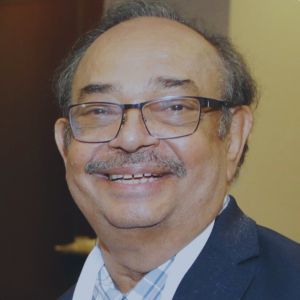 Bhaskar Gollapudi
Bhaskar Gollapudi
Independent Scientist
Tell us a bit about your scientific and educational background.
Earned my B.Sc in chemistry and M.Sc & Ph.D. in radiation/chemical mutagenesis. I have been involved in research on the safety of diverse substances and authored/co-authored more than 150 peer-reviewed papers/several book chapters. I had the opportunity to train undergraduate and graduate students and post-doctoral fellows which helped in the evolution of my scientific interests. My research in genetic toxicology and carcinogenesis is influenced by the many world-class toxicologists and pathologists I had the good fortune of working with.
I am grateful for the opportunities to serve on various scientific groups including the US National Academy of Sciences Committee on Toxicology, USEMGS Council, Society of Toxicology Program Committee, IWGT Steering Team, Chair of HESI Emerging Issues Committee and Genetic Toxicology Technical Committee, to name a few. The Society of Toxicology recognized my contributions to chemical risk assessment with the Arnold J Lehman Award. I served as an Associate Editor of Toxicological Sciences (the official journal of the Society of Toxicology) and currently serving as the Editor-in-Chief of our journal (Environmental and Molecular Mutagenesis).
What do you see as the greatest value or most rewarding aspect of your scientific work?
My contributions to the development of societally beneficial products by applying sound science to mitigate the risk from exposure to mutagenic and carcinogenic substances.
What initially drew you to the EMGS?
EMGS is the "go-to organization" to interact with and learn from the leading scientists in the field of genetic toxicology not only at the annual meetings but also throughout the year because of the contacts I developed at these meetings.
How has EMGS impacted your professional development?
I was able to learn so much by attending the scientific sessions at the EMGS meetings, especially in the research areas that I was not directly involved in. For example, attendance at a 3-hour symposium on a DNA-repair related topic used to help me critically think about the best approaches to the application of genetic toxicology testing and risk assessment strategies.
What advice would you offer to students or early career investigators?
I believe that the current cadre of students and early career scientists are very talented, especially in the application of molecular biology tools to understand the mechanisms. I strongly suggest that the translational value of their research to real-life situations should always be kept in mind when developing the experimental protocols and interpreting the data. This is especially important in contextualizing the effects observed at high dose levels (i.e., hazard) to realistic human exposure scenarios (i.e., risk).
What involvement opportunities with EMGS have you found to be the most rewarding? SIGs, awards, etc.
Helping to organize scientific sessions at the annual meetings is a great opportunity to highlight emerging and emergent scientific issues to the EMGS membership.
What are the most rewarding connections you have made since joining EMGS?
I met a majority of genetic toxicology thought leaders through my association with the EMGS. For someone like myself who worked most of my career in industry, EMGS provided a great opportunity to connect with scientists from academia and the government, in addition to peers from the industry.
 2025 EMGS Program Chair
2025 EMGS Program Chair